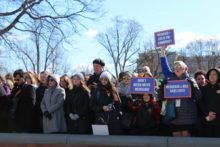By Madison Goldrich

(Photo by Congresswoman Marcy Kaptur’s photostream via Flickr/Creative Commons)
Speaker of the House Paul Ryan finally heard the people singing the song of angry men and withdrew the American Health Care Act (AHCA) from consideration.
Why were the people angry? Many Americans currently benefit from the Affordable Care Act (ACA), or Obamacare, as it is colloquially known. The AHCA was part of President Trump’s plan to repeal and replace Obamacare, but this new bill would have taken away many of the ACA’s components that help impoverished Americans.
While the ACA provided for federal funding of Medicaid, a social health care program relied upon by many of those living in poverty, the AHCA planned to cap federal funding for Medicaid starting in 2020. The AHCA also would have allowed insurers to greatly increase the amount of money that they charge older customers compared with younger customers.
Not only did Ryan’s plan propose these disadvantages against the poor, it also contained benefits for the insurance companies and the wealthy. The component of the bill that allows for a much greater premium for the elderly clearly shows favor for insurance companies over citizens. The bill also proposed repealing taxes for high income individuals and families, and requiring insurance plans from private companies to offer 10 essential health benefits. Some Medicaid plans, though, would not have been required to offer mental health or substance abuse benefitsーan obvious disadvantage for those with less privilege.
While these anti-AHCA protests were happening, I was reading Victor Hugo’s famous novel, Les Misérables, and I noticed a similar pro-economic equality sentiment in Hugo’s writing.
If Victor Hugo was an American alive today, I believe he would have stood right alongside the people protesting the AHCA. In his lifetime, Hugo advocated for the end of poverty by getting involved in the French legislature, including giving a speech to the National Legislative Assembly in 1849 titled Détruire la Misère. In English that is “Destroying Poverty.”
As I mentioned earlier, Hugo’s criticism of the disparity of wealth can be witnessed by picking up (using brute force, of course) a copy of Les Misérables. So many of the characters in this novel encounter great hardships due to the injustices of poverty. Jean Valjean’s entire life is ruined when he steals a loaf of bread for his starving family, Fantine’s only option to provide for her daughter is prostitution, and little Gavroche lives all alone in the statue of an elephant and goes days without food.
Perhaps the best representation of Hugo’s goal of economic equality in Les Misérablescan be seen through the “barricade boys”, whose official name is the Friends of the ABC.
The name “Friends of the ABC” is a pun using the fact that the French pronunciation of the letters A, B, and C together sounds like the French word for “abased”, which means that the group’s goal is to befriend the people less fortunate than them. Scholars speculate that Hugo put a lot of himself into the characters that make up the Friends of the ABC. Enjolras, the leader, envisioned a future in which people “will no longer have to fear famine, exploitation, prostitution from distress, [and] misery from lack of work.”
This revolutionary group of young men used their ideals to motivate an insurrection against the unfair French government and the bourgeoisie, during which they died for their beliefs in progress and equality. It is clear both from the characters that Hugo created to embody himself and from his participation in government that he shared these characters’ beliefs.
We can draw parallels between the Friends of the ABC revolting against what was an unfair government and the present-day Americans who protested the unfair AHCA bill. Because Obamacare does a better job of promoting equality among Americans, we can assume that Hugo would have heavily favored the ACA over the AHCA and would have pushed back against the bill with other protesters.
While Hugo would be pleased with the result of tabling the bill, it could be argued that even the ACA does not do enough to completely destroy poverty in America. He would likely support the ideal of universal health care both for Americans and for people everywhere. After all, as he believed, “Progress is the mode of man”, and the next step in a progressive direction is access to health care for all.
